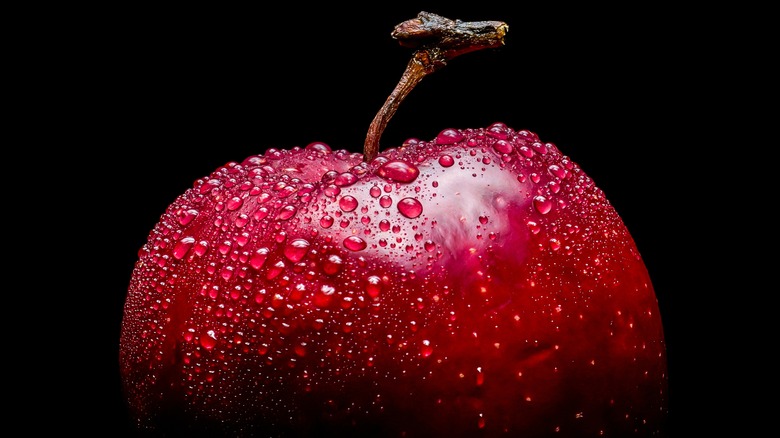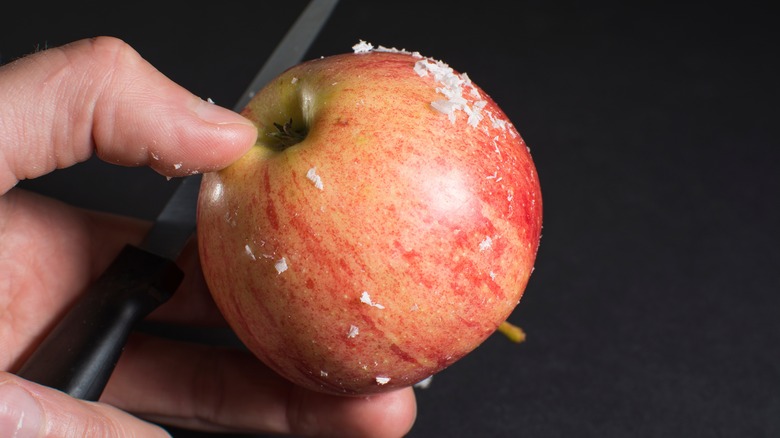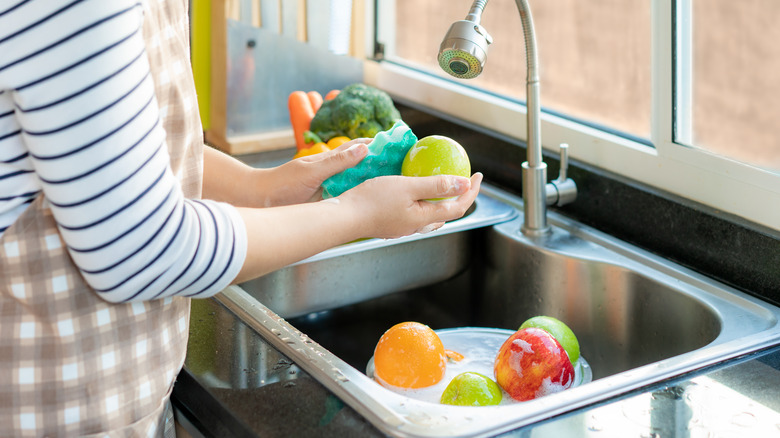Should You Remove The Wax Coating On Apples Before You Take A Bite?
The fruits in our supermarkets are beautiful. They're so evenly shaped, so brilliantly colored, and so alluringly shiny. They're perfect, but since we constantly hear that perfection is unrealistic, we're suspicious whenever we witness it. If you've ever questioned the uncanny sheen of a supermarket apple, you were right to do so, as the shine actually comes from a wax coating on the peel. This won't be news to most – the FDA and PMA (Produce Marketing Association) have been open about the practice – but when people learn this fact for the first time, they sometimes freak out a bit. When such people take their concerns to social media, they create a prime environment for misinformation to spread.
From time to time, a post goes viral warning consumers about the wax on fruit. A TikTok post about apple waxing from 2020 garnered nearly 6,000 likes, and a subsequent post from 2021 racked up more than 100,000 likes. The latter post went so far as to warn viewers that eating the wax could cause cancer. Both posts urged consumers to remove the wax coating, either by washing it off or peeling the fruit. This takes extra effort, but if it saves you from cancer, it must be worth it, right? It's always risky to take medical guidance from TikTok, and this is a perfect example of why. That wax coating isn't the threat you've been told it is. In fact, there's a very good reason it exists.
Why do we coat fruit in wax?
Fruit waxing serves two core purposes: preservation and presentation. All fruits have a natural wax coating that acts as a sort of survival mechanism. It prevents microorganisms from invading and moisture from escaping. Without that layer of wax, fruits (which are typically 80-95% water) would quickly shrivel up and spoil. However, when apples are picked for commercial purposes, they must be washed before they go to the grocery store in order to remove dirt as well as any natural or synthetic pesticides, and this washing process ends up removing the fruit's protective layer. To make up for the loss, the washed apples receive a new coat of wax.
By preventing spoiling and moisture loss, the added wax dramatically increases the fruits' shelf life, allowing them to be stored for longer periods and shipped over greater distances. The wax also adds a glossy sheen that makes fruits more aesthetically attractive in the eyes of most consumers. Different types of wax are used for this purpose, the most common being Carnauba wax, derived from the leaves of Brazilian palm trees, and Candelilla wax, derived from a type of desert shrub native to Mexico and the southwestern United States. The fruit may be dipped in the wax, although it is more common to apply it via spray nozzles. Before application, the wax is diluted in so much water that a single gallon of wax can cover as much as 10,000 pounds of citrus.
Should you worry about wax?
Various health concerns have been raised, the most serious being that the wax coating is carcinogenic. Consequently, you'll find a seemingly endless stream of online posts telling you how to remove it. For the most part, running it under the faucet won't be enough, as the wax coating is designed to be water-repellant. It takes a scrubbing tool, like a soft brush, to effectively remove the coating, and you may even need a natural cleaning agent such as baking soda to do a thorough job. Others suggest peeling the fruit, but the skin is one of the healthiest parts of an apple, so you don't want to lose it. In truth, you don't need to do either of these things because the wax on apples is safe to eat.
The sources claiming that fruit waxing causes cancer are mainly social media influencers who don't back up their claim with concrete evidence. Meanwhile, fact-checking by Snopes found no known carcinogens in any of the common fruit waxes. In fact, the wax is indigestible, which means it passes through our digestive system without being absorbed by the body. There are some concerns that wax coats may trap pesticides, but the initial washing process should have removed those already. To be extra safe though, you can buy produce grown without synthetic pesticides, per the USDA organic guidelines.


